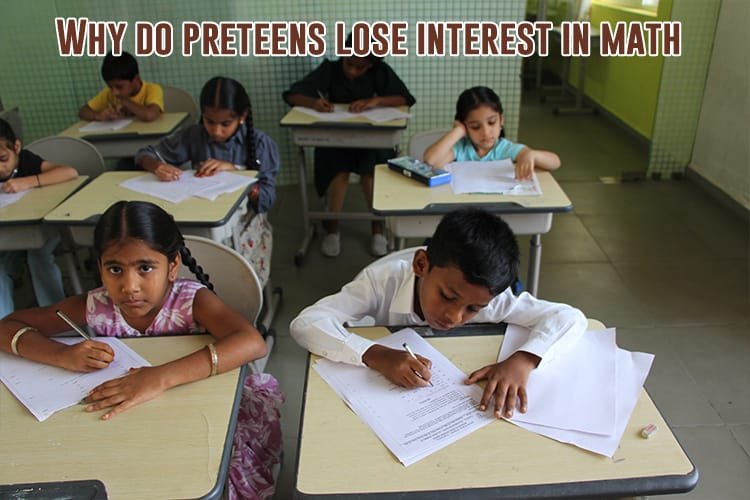Mathematics helps us understand the world around us. Unfortunately for preteen students, it is still a difficult task to handle. It can feel more like a secret code they’re forced to decipher. In between the effortlessness of summing up blocks and solving difficult algebra theorems the separation often leads to failure to lose the curiosity related to mathematics. Now the question is, why does this take place, and more importantly, what can we do to reignite the desire for figures? At Delhi Public School Warangal, recognised as the top best CBSE day and residential school in Warangal, we are dedicated to finding ways to make mathematics engaging and enjoyable, helping students rediscover their passion for this essential subject. Let’s explore how we can foster a love for figures together.
Accepting the problem related to preteens losing interest in math:
Intellectual development –
The slowly decreasing interest towards mathematics is a complicated situation for the preteens. The basic reason lies with the blend of features as an extension of intellectual development for common perceptions.
The main concern changes over time-
As the swift shift from preteen to teenage years teaches a lot of intelligent experiences with major ups and downs, the main concern changes over time. The preteen students transform and become more accustomed to social changing aspects with the quest for authentication, validation and approval from peers. Unlikely, arithmetic might not constantly support the recent comforts.
Ineffective traditional method of teaching –
The old-fashioned tactic of teaching mathematics, time and again pushes more on memorization and repetition culture than on adopting an honest understanding of calculation concepts.
Social stereotypes-
The most important part is the static mindset and related ideologies, constant fear of being typically typecast in the public and false impressions which play a vital role in preteens caring for the subject.
Useful strategies to make math interesting:
1. Using real-world examples –
Take real-life examples and presentations as to how doubling a recipe can involve simple math as scaling up the quantities and proportions of ingredients. Math or calculation is a handy skill for not only maintaining proportion but also helps in scaling up and down according to the need. Studies have shown that incorporating real-life examples into math lessons increases student engagement and comprehension.
2. Making a challenge –
Creating a challenge to ignite curiosity among students can be a great approach. It will boost interest to take up any challenge in arithmetic, calculation, and algebra. Using mathematical problems as riddles to be solved rather than ordinary drills can motivate a sense of sports and intrigue.
3. Using advanced tools and technology to simplify the problem –
Leveraging expertise tools and assets can make the education of math more collaborative and vibrant. Learning apps, virtual tutorials, and collaborative models can provide preteens with direct knowledge and understanding that is both attractive and educational.
4. Having a progressive mindset –
A proper introduction to a growing mindset and developing a progressive frame of mind can help preteens view tasks as chances to progress and benefits to developing flexibility and persistence in their journey without thinking of the subject as insuperable hurdles
5. Collaboration with others –
Peer-to-peer education and cooperative problem-answering can create a helpful cultural atmosphere where students can feel endowed and research mathematical notions without fear of failure.
6. Enjoying success –
Celebrating small victories will boost preteens’ confidence and motivation. Whether it’s solving a challenging problem or understanding a difficult theorem, acknowledging the progress will fuel their enthusiasm for math.
How parents can help –
- Parents can help their preteen children by providing additional support from tutors, teachers or mentors. Even a different perspective or teaching technique can help a student to make a significant difference in this field.
- The best way to accomplish the enjoyment around mathematics is to celebrate small successes and appreciation. Encouragement from parents and praise can demolish negative attitudes about mathematics.
- Fencing curiosity and making it relevant to real-life problems are important to make mathematics a fun activity and enjoyable. From a simple example of cooking to budgeting and video games, math has been used in every aspect of life.
- Providing practical examples such as figuring out discounts, shopping through calculation, understanding distance through maps and measuring ingredients and playing indoor and outdoor games can help preteen students understand math in a better way.
It is an intimidating task to understand the continuous detrition of attention towards a particular subject amongst preteens but it is not that insuperable. The appreciation of fundamental factors of the problem which contribute to this occurrence and applying the right plans and strategies helps to reignite the urge for calculations and counting. We can allow preteens to embrace mathematics as a tool for exploration, finding, and invention. At DPS Warangal, we are committed to working together to solve this challenge and encourage the future problem-solvers. Let’s work together to solve the secret and inspire our young mathematicians.


